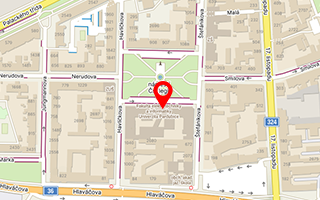Published: 12.01.2021
Enhancing the working conditions of the academic staff or promoting career growth of junior researchers. Creating a comfortable research environment. These are the objectives of the STROP project, which has started this January. Thanks to the project, the University hopes to win a European award that will increase its prestige not only abroad. Adéla Myšková, University’s HR Manager, will introduce the rationale of the project as well as the results of an employee satisfaction survey.
What is the rationale of the project?
The project aims to improve the relations between employees and their employer, and create comfortable research conditions. The ambition is to get the HR Excellence in Research award, a European HR certificate. Holding the award shows international researchers that our university offers friendly and comfortable research environment.
Is it an important hallmark of quality then?
Absolutely. The award guarantees standards for international researchers. It will increase the prestige of the University of Pardubice and help us obtain funding. Back in December 2019, the European Commission recognized that we had endorsed the European Charter for Researchers and the Code of Conduct for the Recruitment of Researchers. That means that the institution complies with the principles defined by the Charter.
Can you tell us more about the principles?
The Charter sets out 40 general principles. In spring, we conducted a survey to see how well we complied with the principles. Even though the project targets primarily researchers, we would be happy if the working conditions improved for all employees. Therefore, we sent the survey out to all university employees. The survey included 80 questions, and was strictly anonymous, so the respondents were not required to give details such as their age.
How many people did you send the survey to?
We sent the survey to a total of 1283 employees, of whom 748 responded to it. First we asked whether they wanted to participate in the survey, and 642 respondents said yes and completed the entire survey. The respondents included members of the academic staff, researchers, PhD candidates and other administrative staff. The questions varied depending on the employee category. Naturally, we could not ask researchers and administrative employees the same questions.
Who was responsible for the survey?
Well, analyses are complex, so we cooperated with experts from the Faculty of Arts and Humanities as well as IT specialists from the University computer center.
What is the outcome of the survey then?
The survey offered useful feedback for the university and faculty management in relation to the further HR development and preparation of university strategic documents. We used gap analysis to compare the existing situation with the requirements of the European Charter for Researchers and the Code of Conduct for the Recruitment of Researchers
We needed to identify weaknesses inherent in the internal system. We prepared a document dealing with recruitment, which reviews our procedures related to the Code, our procedures used to recruit members of academic staff and researchers, as well as other employees. The document also discusses how we work with them once employed and how we help them develop their careers. This will serve as a basis for the University’s Open Transparent and Merit- Based Recruitment Policy. These documents together with further analyses and discussions are the foundation of the HR Action Plan for the following three or more years.
At the moment, the project is in its first stage. We are submitting the required documents to the European Commission. It took us 12 months to prepare them. Two more years of the project are ahead of us. At the beginning of the year, we would like to implement the action plan. The European Commission will assess whether we have taken the right steps, and accordingly we may receive the HR Award. We should know in March. Afterwards, we will be authorized to use the official HRS4R logo. We would like to join other Czech and European universities that already hold the award.
Was there anything that surprised you in the survey results?
I was happy to see that employees were happy with the research and working environment and that they deem the technical facilities to be good. We count on state-of-art laboratories and equipment, which was reflected in their answers. Employees of the faculties that had been renovated made positive comments about the work environment.
Any negative comments?
We saw no strong negative comments. Some employees would appreciate better pay. However, overall satisfaction with the pay was quite high.
Having said that, the project has something to improve...
There is always room for improvement. It would be strange if everyone was 100% satisfied. The survey included both multiple-choice and open questions. Any comments were also welcome. The principles of the Charter cover a wide range of issues and that is why the survey included so many questions. There was, however, no “wow” effect where we would feel to be doing really badly. Let’s not forget that surveys are but one tool used for HR analyses and development.
Are employees more open?
It depends on what you ask about. There has never been a similar project at the University. The response rate is high even compared to other Czech universities. It shows that people appreciate that work-related issues get discussed and the quality of work conditions and environment improves. It is a task for the university management to make sure that it is done in compliance with the European Charter and Code.
What issues are addressed in the Charter and the Code?
The documents refer not only to employer’s obligations, but also to employees’ responsibilities. The Charter and the Code cover four main areas. Ethics, ethical and professional principles, recruitment, working conditions, social security and education and career development. For researchers, the European Charter stresses research freedom, ethical principles, professional attitude, accountability, dissemination and exploitation of results, supervision and managerial duties, continuing professional development, or recognition of the profession... There must be a shared feeling that the conditions are the same for everyone and there is no discrimination.
I guess discrimination is a topic high on the EU’s agenda.
In fact, a vast majority of employees have stated that they have not encountered discrimination. And if they have, they were discriminated on grounds of age or gender. Gender equality and balance is a topic that is stressed a lot.
Speaking of gender discrimination...what is the ratio of male and female employees at our university?
You are right that gender balance is emphasized a lot. The faculties are, however, specific in terms of gender, some employ more women, others more men depending on the respective fields. For example, the Faculty of Electrical Engineering and Informatics employs more men, while the Faculty of Health Studies more women. Elsewhere, e.g. in university bodies or management, we strive for gender equality. All in all, the gender balance at our university is quite good.
How about external evaluation by the European Commission?
The European Commission should conduct an external evaluation after three years to see whether we are going the right way. The EC representatives will talk not only to the university and faculty management, but also to researchers and members of the academic staff at various levels, as well as managerial employees. Frankly speaking, our action plan is very ambitious and I hope we will be able to meet all the goals. The plan is intended to move us forward and to take gradual steps to improve the academic and research environment as well as the working conditions. I hope that the employees will soon notice the changes for the better.

